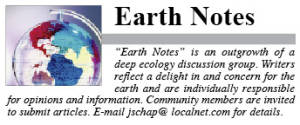Consuming or sharing?
By Sally Chappell
 “All I want is what I have coming to me. All I want is my fair share.†Immersed in the consumer — errr holiday — season as we are, Charlie Brown’s little sister, Sally, invites us to ponder: What is my fair share?
“All I want is what I have coming to me. All I want is my fair share.†Immersed in the consumer — errr holiday — season as we are, Charlie Brown’s little sister, Sally, invites us to ponder: What is my fair share?
We are sharing the goods of the earth with more than seven billion other human beings and in the process of divying things up, we are driving other species into extinction. Having lived in an underdeveloped country for two years, I instinctively know as an American that I have more than my fair share. Why are we being encouraged to consume more as if the American economy depended on money we spend during the holidays?
The marketeers have dreamed up “Black Friday,†“Cyber Monday†and now, “Small Business Saturday.†Less well known is “Buy Nothing Day†(the day after Thanksgiving), countered by those who understand the need for an altered economic paradigm. How did a desire to spread joy and good cheer during religious holidays devolve into “competitive shopping†exercises with people using smart phones for scampering to stores with the best deals?
To help us understand that the global economy is not dependent on consumer spending, Ian Angus, in his article, Did consumers cause the BP oil disaster? proposes four arguments to debunk the “consumer sovereignty†myth:
1.) Markets are manipulated by corporations that represent 53 of the 100 largest economies in the world. They spend over a trillion dollars a year on marketing (Michael Dawson. The Consumer Trap: Big Business Marketing in American Life, 2005) to “set the terms under which the market operates, define the range of permissible choices, and promote the constant expansion of needs and purchases that their products depend on.â€
2.) Inequality among consumers exposes the capitalist market as a plutocracy. Figures from the World Institute for Development Economics Research offer a glimpse at the astounding concentration of wealth with the richest two percent of adult individuals owning more than half of all global wealth.
3.) Restriction of market choice denies consumers the ability to significantly alter the direction of development. For example, we can choose among the various cars offered on the market, but most of us cannot choose between cars and public transportation.
4.) Consumers are not in charge of production. “A small minority of powerful individuals…are empowered by their access to production capital.†They decide how and where something will be produced (or not produced), who will produce it, and which natural resources and ecosystems will be exploited and affected.
As an update, Angus and co-author, Simon Butler, have just published, Too Many People? Population, Immigration and the Environmental Crisis, in which they argue that corporate consumption, high prices and wasteful industrial practices, not overpopulation, are the causes of world hunger and environmental degradation, especially with food being converted to fuel for cars.
Along these same lines, Jared Diamond, in a New York Times opinion piece (http://www.nytimes.com/2008/01/02/opinion/02diamond.html?pagewanted=all), points to a first-world lifestyle among the richest billion people on earth as “unsustainable.†We, Americans, have a per capita consumption rate 32 times that of countries like Kenya. Eliminating waste would help reduce the difference in lifestyles between the first world and the developing world. He maintains that living standards are not dependent on consumption. Diamond predicts, “Just as it is certain that within most of our lifetimes we’ll be consuming less than we do now, it is also certain that per capita consumption rates in many developing countries will one day be more nearly equal to ours. These are desirable trends, not horrible prospects. In fact, we already know how to encourage the trends; the main thing lacking has been political will.â€
During these Holy Days, St. Paul offers good advice, “Warn those who are rich in this world’s goods that they are not to look down on other people; and not to set their hopes on money, which is untrustworthy, but on God who out of his riches, gives us all that we need for our happiness. Tell them that they are to do good, and be rich in good works, to be generous and willing to share — this is the way they can save up a good capital sum for the future if they want to make sure of the only life that is real.†(1 Timothy 6: 17-19.)
Whether our personhood is individual or corporate, and especially through our democratic political process, we might turn Sally’s Christmas hopes into this question: With whom can I share so that all will have what is fair?
Sally Chappell is a resident of Bridgton.

